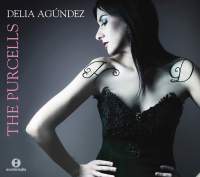Texte paru dans: / Appeared in: |
|
|
Outil de traduction ~ (Très approximatif) |
|
|
Reviewer: David
Cutler This is an adventurous CD—Purcell with a dash of continental color and passion, and you get two Purcells, Henry and Daniel, for the same price. Daniel Purcell was born in 1664, five years after his elder brother. At the age of 14, Daniel became a chorister at the Chapel Royal, like his elder brother. In his mid-20s he was appointed organist of Magdalen College, Oxford where he began to compose. One of his first engagements was to complete the concluding Masque for act V of the semi-opera The Indian Queen, the preceding music for which had been written by brother Henry during the early months of 1695. This CD marks the debut on the Enchiriadis label for Spanish soprano Delia Agúndez. Agúndez, born in Caceres, qualified with a Higher Diploma in singing at the Liceu Conservatory in Barcelona. She was taught by soprano Carmen Bustamante. She also holds Degrees in History and Music Science and Art History. She won the National Youth Institute award for the Best Classical Music Performance, in recognition of her first album, Voleras—Spanish music for voice and guitar. On stage, she has sung small parts, including Belinda in Purcell’s Dido and Aeneas and Galatea in Handel’s Acis and Galatea. She is a marvelous singer with a very light and pure soprano. She also has an innate understanding of style and excellent diction in English and this CD is therefore a joy to behold. Incassum Lesbia as the booklet says, is a “sort of elegy in C minor written in Latin for the Queens funeral” and is one of Henry Purcell’s last works. Agúndez sings this with simple decoration and great feeling. “Regina heu” (Queen alas)—each repetition of this phrase is sung differently, and “singultu” has very smoothly sung runs. A quick comparison with the splendid Anne Sofie von Otter reveals Agúndez to be the more acute in her interpretation, and also less heavy with her use of vibrato. In the cantata Apollo and Daphne there is a nice contrast between the opening recitative and the aria beginning “Dearest Daphne,” and then a gorgeous repeat of “Daphne” again, with each one differentiated. Here with the soprano manages the leaps with consummate ease. Another fine demonstration of Agúndez’s interpretative abilities is in O solitude by Henry Purcell, which according to the booklet “unfolds over twenty-eight hypnotic repetitions of a melancholy four bar basso ostinato, a close relative of the renowned chaconne of Dido’s lament.” Agúndez is accompanied by Manuel Minguillon on an archlute and Baroque guitar, and Laura Puerto on harpsichord and organ. The sound is good, but quaintly old fashioned in that the voice sometimes comes out over one channel and the instruments over the other. On track 9, the cello introduction comes out on the right and the voice later joins in on the left. This should not distract anyone, and I recommend this very talented soprano and this CD to anyone interested in Henry Purcell and his younger brother, Daniel. | |
|
|
|
|
Cliquez l'un ou l'autre
bouton pour découvrir bien d'autres critiques de CD |
|




